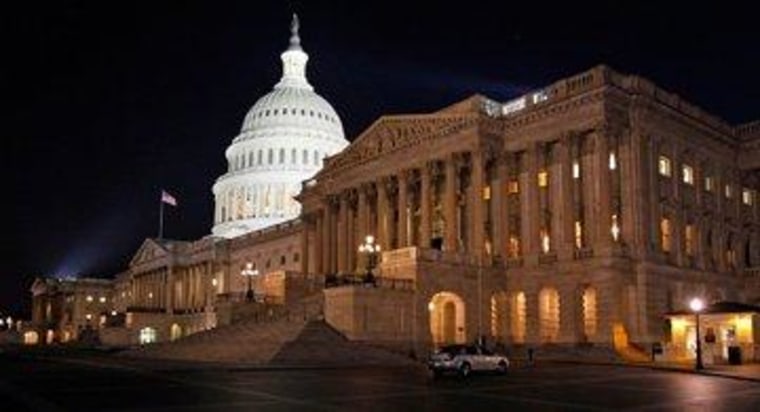As the dust settles in the Senate after yesterday's drama, it's worth pausing to take stock and consider just how much, if anything, has changed in the institution.
In a sense, there's a reasonable case to be made that we've defined "crisis" down. After all, the Senate had a fight over a procedural question on cloture as it's applied exclusively to executive-branch nominees. Say that sentence out loud to much of the American mainstream, and I imagine you'll get quite a few blank stares.
So the question then becomes, why should you give a darn? Will what transpired in the Senate yesterday actually, you know, matter? Will it make a practical difference to anyone other than those of us preoccupied with political machinations in Washington?
The cautious answer is that it's evidence of incremental progress, the results of which will have a real-world impact on the lives of real people.
The Consumer Financial Protection Bureau, for example, looks out for consumers against predatory excesses from the financial industry. As Sen. Elizabeth Warren (D-Mass.) told Chris Hayes last night, in light of yesterday's deal and Richard Cordray's confirmation, "We know this agency is here to stay. No more clouds over what it legally is entitled to do. No more attacks that say maybe we're going to be able to undercut it in this way or weaken it in that way. We've got a full-fledged watchdog. The one we fought for, and [Cordray] is going to be there to fight for us."
And in light of Congress' inability to legislate, this dynamic will carry over to other areas -- President Obama's ability to govern in his second term will increasingly depend on executive-branch nominees like the those included in yesterday's Senate agreement.
From the outside, it's easy to view the prolonged battle over arcane rules as another Washington sideshow. It wasn't. The progressive core of President Obama's second term agenda, from climate change to Wall Street reform, runs through those nominees and Democrats did not make their threats lightly. [...][GOP obstructionism] might have been tolerable until a federal appeals court ruled early this year that President Obama could not fill the positions with recess appointments. Democrats now had to either fix the Senate procedure or leave crucial agencies' rudderless for an indefinite period."It's the only way, in many cases, the president can have any impact on policies he cares deeply about," Thomas Mann, a senior fellow at the Brookings Institute and prominent critic of GOP obstructionism, told msnbc.
This certainly applies to Cordray, but it also extends to Gina McCarthy's upcoming work at the EPA, Thomas Perez's efforts at Labor, and the very existence of the National Labor Relations Board, the nation's most important entity in addressing unfair labor practices.
Also note the precedent, at least for the short term. The Senate Republican minority has believed for six years that reflexive obstructionism could continue, broadly and indefinitely, without consequence. Senate Dems made a specific threat, assembled the votes, and was prepared to follow through, forcing the GOP to cave and leaving Minority Leader Mitch McConnell (R-Ky.) beaten and embarrassed.
If you consider the rapid evolution of the Senate into a super-majority institution as one of the most important political developments of our generation -- and I do -- then yesterday's drama represents meaningful pushback against the status quo. Jed Lewison argued persuasively:
This battle was fought over presidential nominations, but the key thing is that virtually every Democratic senator has now taken the position that the filibuster can be eliminated by a majority vote. That's a big deal because if you can get rid of a super-majority requirement by simple majority vote, then the super-majority requirement is essentially optional.In recent years, Republicans have treated the filibuster as if it were an irrevocable Constitutional right, and not a simple rule that can be changed. Today, Democrats -- whether they realize it or not -- have killed the GOP's interpretation of the filibuster as a perpetual, immovable feature of the Senate meant to be used on routine matters of business.That doesn't mean the filibuster is gone, and it doesn't mean Republicans won't continue to abuse it. It's here, and surely they will. But when they do, Democrats won't be able to claim to be powerless in the face of GOP obstruction.
Looking ahead, the White House will be sending plenty more executive-branch nominees to the Senate for confirmation in the coming years, including some next year to join the Independent Payment Advisory Board. Republicans will howl, but Dems have begun drawing lines in the sand -- the minority cannot continue to block agencies' existence through filibusters. Full stop.
I've heard plenty of criticisms of yesterday's agreement, and detractors have raised fair concerns. The Senate, for example, is still a dysfunctional mess. Filibuster rules, in desperate need of reform, remain in place for literally everything -- legislation, judicial nominees, and executive-branch nominees -- and it appears the appetite for sweeping institutional changes is severely limited, in both parties.
But in today's environment, incremental progress is still progress, and there's ample reason to believe yesterday's deal moves the ball forward.
